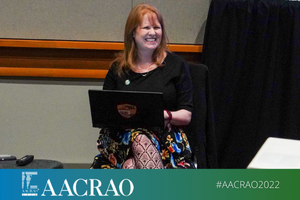
By Mariana Patterson, AACRAO Marketing and Communication Coordinator.
At the 107th Annual Meeting, Megan Henkin EdD, PMP, presented
her session on gender pay inequity and its implications on women's propensity to pursue an advanced degree. Dr. Henkin discussed
the results of a Georgetown University study, which found that women with master's degrees receive the same earnings as men with bachelor's
degrees upon graduation; moreover, women with doctorate degrees earn the same salary as men with master's degrees. Dr. Henkin asked her session attendees, "Why does this happen, and why are women experiencing greater pressure to level the playing
field?"
According to the 1963 Equal Pay Act, "no employer shall discriminate [based on] sex by paying wages at a rate they pay to employees of the opposite
sex when their performance and skill requirements are equal." Dr. Henkin pointed out loopholes in this law; employers can potentially preclude advancement with the consideration of merit pay, seniority, and quantity and quality of work. The
Equal Rights Amendment (ERA), which did not pass the ratification process, states that "equality of rights...shall not be denied or abridged by the [government] on account of sex." The 2016 ERA Coalition Report found that 94 percent of Americans support the ERA; however, 80 percent believe it's already in the Constitution.
Dr. Henkin conducted a study of 17 women with a master's degree or higher to determine their intentions of investing in an advanced degree. The qualitative study proposed the following prompts to the participants:
- Why they chose to pursue an advanced degree;
- What are their attitudes, opinions, and beliefs about advanced education and pay inequality;
- Whether or not, and to what degree, their knowledge of the pay gap influenced their decision;
- What types of changes did they experience in their compensation and advancement prospects after earning their degree;
- What actions do they believe organizations and communities need to take to address the gender pay gap and support women's advancement in the workplace?
The study results reported that the participants' decisions reflected personal goals and experiences; they were passionate about the field and wanted to have an immersive academic experience. Some, however, noted that they found that an advanced degree
was the minimum qualification for upward mobility in their field. All of the women stated that having an advanced degree had a measurable impact on being able to advance in their careers.
Dr. Henkin called for the execution of further research on different characteristics of women, such as race, gender identity, and the choice of motherhood, which can potentially significantly impact the findings of these studies, as there
is a lack of data representing these variables. She mentioned that advancement requires individuals to research, connect, negotiate, advocate, and confront bias to address career inequities—allyship from others is also crucial in carrying out these measures. | |
Looking for a new series to watch? Session participants recommended watching "Mrs. America," which explains the ERA ratification movement.